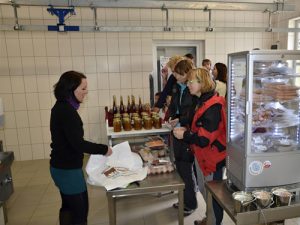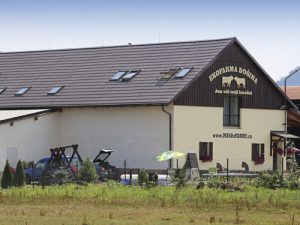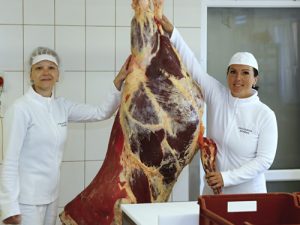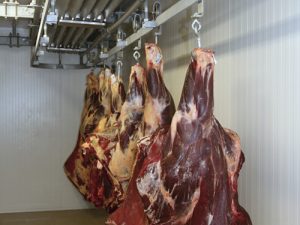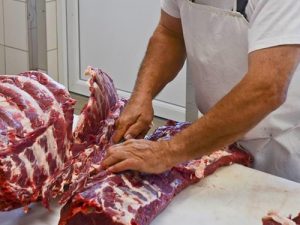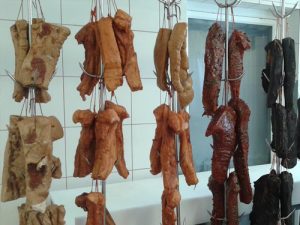This case study focuses on cooperation at between an eco-farm in Bošina in the northern part of the Czech Republic that has been managed by a couple of middle aged farmers since 2001 and two other farmers from the surrounding area. The Bošina Family Farm is mainly specialized in livestock production. A slaughterhouse was established in 2012 by the husband and wife team and they allow the two neighbouring farmers to use their equipment for their own meat processing.
Area: Eco Farm Bošina – 353 hectares
Ohers two farmers 290 + 124 hectares
Eco Farm Bošina is located in a small village called Vernéřovice at an altitude of 465 meters above sea level. Mr. Bošina and his wife Mrs. Bošinová are two middle-age farmers that manage 353 hectares of land. It is primarily pasture, with only 50 hectares arable land which is used for wheat production. Family Farm Bošina specializes in livestock production. They have a herd of 220 Salers cattle, 80 Mangalica pigs, andl poultry farming including chick- ens, ducks and geese. All animals are bred in accordance with ecological standards. Since 2012, the couple have managed their own slaughterhouse and meat cutting plant. In 2017, they began producing organic smoked meat and set up a new farm shop.
Livestock production and the slaughtering of farm livestock are managed by the owners. However, two other farmers who also manage their own farms in an organic way asked if they could share the slaughterhouse for processing their own cattle. These two farmers are based in the surrounding area, less than 25 kilometers from the Bošina farm. This works well as the animals do not become distressed during transportation due to the short distance be- tween the farms. For this instance of cooperation, there was no need for any special education or training. The main agreement among the farmers was that they would seek to ensure positive benefits for the animals’ welfare during operating procedures. All farmers strictly adhere to maintaining all welfare conditions from pasture to slaughter and finally to the meat processing stage. All slaughtering procedures from the beginning right through to the end are managed by a contract between the farm owners and farmers who bring cattle - cows, bulls and calves. Pigs and poultry are not slaughtered. Each animal spends its last night before slaughter in the stable and is assessed by a vet who is paid a fixed fee in accordance with the contract. The slaughtering and meat cutting are carried out by a butcher who is an employee of the Bošina’s farm. There is a contract regarding the cost of his labour and it is set at a fixed tariff per animal. After cooling and quartering the carcasses, they are transferred into maturation box. All transport costs are attributed to the farmers. All methods of meat processing are the same for all of the farmers and it is straightforward due to the small number of farmers involved. The farmers that collaborate are also close friends and share the same expectations and needs. While not as common, there is also a demand for meat processing by the process of smoking, so new contracts are being prepared. These contracts will be product-specific. The butcher uses the equipment that is owned by Bošina’s Farm and there is a fixed price per kilo of product (sausages, salami etc.), which is of course lower than the final price of similar products in the farm shop. This amount is usually small, because the smoked meat is only for family or close family friends. These products are not resold again by these farmers.
Advice/Recommendation
“The most important factor is to choose farmers with the same principles and attitudes towards animal welfare. All steps of the meat processing must be agreed in a contract which is mainly determined on a fixed price basis. Due to hygiene standards and the degree of safety that is necessary, it is recommended to hire a professional butcher. It is best to follow the same procedures for all products to assure the same hygiene and quality standards.
An experienced and competent worker should be employed to ensure these standards are met. It is also vital to establish prices before beginning the meat processing process and everything should be outlined and written into a proper contract. It is important to properly account for the energy costs associated with the processing when writing these contracts. The modernization of existing buildings, construction of new sheds, and installation of new machinery was necessary to convert the farm into an organic producer of high quality beef. It is also important to consider the succession process in the business plan to have a clearer view of what will happen to the farm business in the future.
Bureaucracy and lack of information from the authorities were the most challenging aspects. Authorization for the farm slaughterhouse and new premises were quite difficult to obtain and time-consuming. Information
on potential funding opportunities, specifically on Rural Development Plan measures can be used to support farm investments and are very useful for a successful farm succession. A solid knowledge base in agriculture is very useful for managing the farm.”
Queries/Questions
- This kind of small scale cooperation amongst farmers are usually not so difficult to set up. Have you ever thoughts about this possibility? Could it be possible with some of your neighbour farmers?
- Do you think that valorising autochthonous product could be a way of being more competitive on the market? Have you ever thought about growing autochthonous products from your region? Is some of your neighbour farmer doing it? If you’re not, why?



 Čeština
Čeština  English
English  Français
Français  Deutsch
Deutsch  Italiano
Italiano  Slovenščina
Slovenščina  Español
Español 